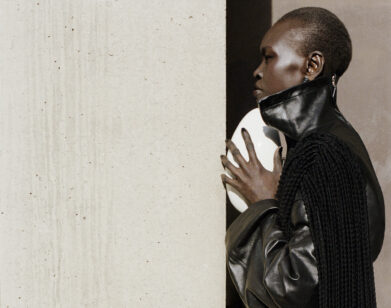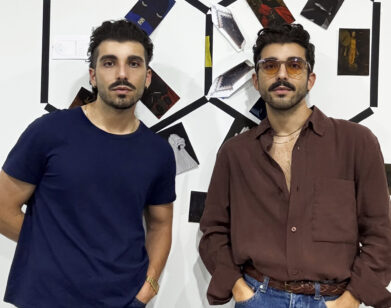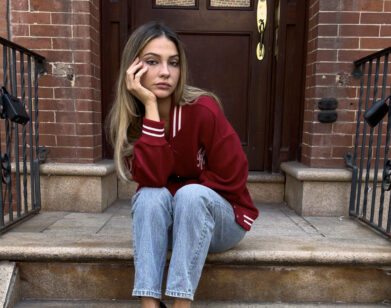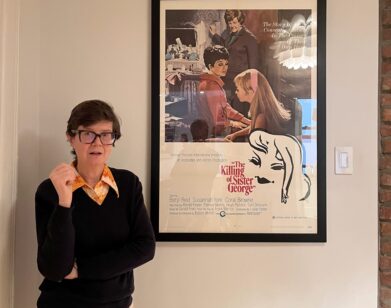Tori Amos’s Musical Memories
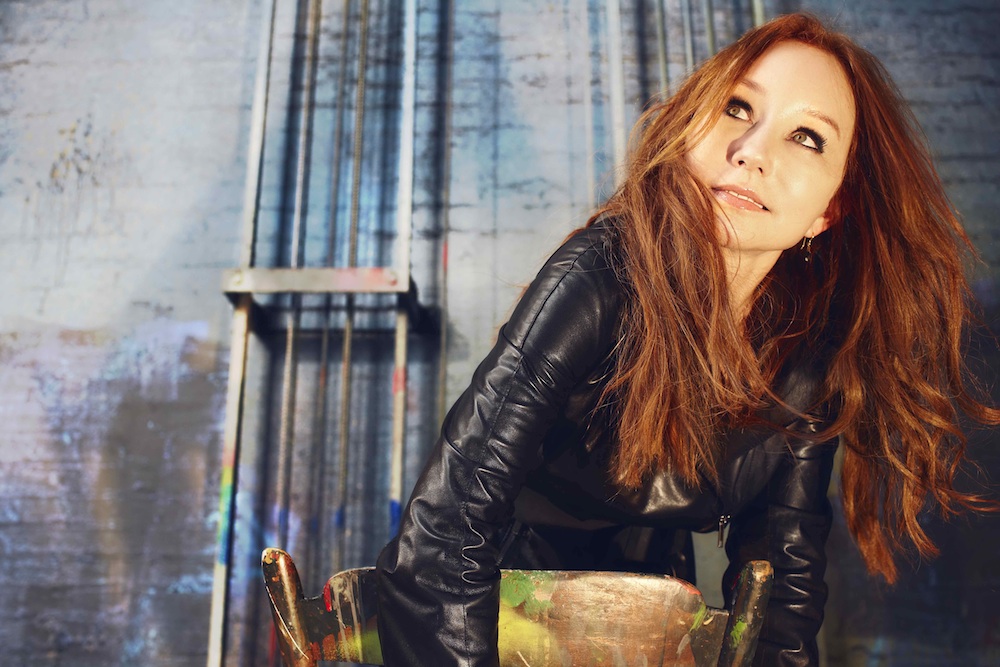
ABOVE: TORI AMOS. PHOTO COURTESY OF AMARPAUL KALIRAI.
It seems totally logical—if not actually inevitable—that Tori Amos would eventually write a musical. Over the last two decades, the singer and composer has created work that exists in its own rarefied universe. Her music is often character-driven, populated by winding narratives in which Amos herself serves as both muse and guide. It is these talents that Amos brings to her musical The Light Princess, which made its debut at London’s National Theatre in 2013 to great acclaim. Based on the 19th-century fairy tale by George Macdonald, the musical tells the story of a prince and a princess, who each lost their mother at a young age. The young prince becomes so forlorn that he is unable to ever smile, while in another kingdom a young princess becomes so light with her own grief that she floats into the air. Balancing the whimsy of a floating heroine with heavier themes regarding grief and rebellion, The Light Princess feels both remarkably contemporary and incredibly prescient. Though it remains to be seen when a full-scale production of the musical will arrive stateside (Amos hints that plans are afoot), the original cast recording was released earlier last month—a beautifully-packaged disc that includes two songs from the musical performed by Amos herself.
We sat down with Amos over tea to discuss the musical and her continued journey as a songwriter and performer. Somehow we also ended up talking about her childhood, show tunes, and Led Zeppelin.
T. COLE RACHEL: Be honest—does doing interviews like this drive you crazy?
TORI AMOS: Please don’t take this the wrong way, but I find that if you get somebody who really wants to have a conversation, then it’s good. I’ll tell you what I hate: “So tell me about this Light Princess. What is this?” Fuck off, do your homework. It’s like, I’m doing my job here, now do your job…or at least read the press release before we sit down. I’m not talking to you, Cole, but you’ve interviewed me before, so you know how I am. When interviews are good, the conversation can be amazing. Sometimes I’ve had conversations with journalists that I’ve never had with anybody else.
RACHEL: That’s how it should be. It can be really surprising and very profound, often when you least expect it.
AMOS: Yeah. I discover things I’ve never thought about regarding my work, because they thought about it. So when you ask me do I like doing interviews…I either adore it or I feel like you don’t really want be here, so why are we wasting each other’s time? [laughs] But not today!
RACHEL: The Light Princess is your first foray into writing a musical, which makes total sense. Did you grow up on musicals? Where you a theater queen as a child?
AMOS: No, not a theater queen. I would say my mother was, so I was getting pumped with a lot of musical information very early on in life. I was playing at two, two and a half. There are pictures of me doing this. My mom, you can talk to her, she’s a minister’s wife and part Native American, and I’ve never known her to lie. She’s just not that type of woman. She’s not a stage mom. She’s a real spiritual lady who calls herself a Christian, but actually walks the walk. She didn’t want to be a performer. She wanted to be a literature major, and gave that up because she thought she was marrying a doctor, and then he became a minister because [of] his mother, who’s a missionary teacher, who was part of Church of God. She comes from a Scottish line, so they were more Puritan—no dancing and singing only for God. He went into the ministry and became a Methodist minister. They were from the South.
I’d love to show you pictures of my mother, because she reminds me of Snow White and Audrey Hepburn. You just don’t see her as a minister’s wife. She worked in record stores as a teenager, so she had all these records, all these albums, from Nina Simone to Fats Waller to Nat King Cole to Frank Sinatra, Judy Garland’s Meet Me in St. Louis, Oklahoma. She had a lot of those shows. Also, my brother—who was almost 10 years older—was bringing in records at the time. My mother tells me that my father would leave in the morning, she’d lock the door, and the records would come out. The whole thing is that I could play pretty much anything. If you played it for me I could play it back for you after a few hours. She said we’d be huddled over by the stereo, and then I would play it back for her.
Then my brother would come in and play me his records, and I’d be learning that, so when my father got in by 5:30 for dinner, he’d sit with his paper and I would play things—but in my way—and he wouldn’t really know what was going on, because he wasn’t familiar with new music anymore; he’d moved out of that. In his mind, I think he wanted to be Billy Graham. That’s where he was. He was a really good preacher. Then I was at the Peabody at five, studying classical music. Those old records and show tunes were a part of my building blocks. It was her thing, and because it was her thing and I loved her so much, it became something that I loved too.
RACHEL: But you were eventually kicked out of that school, right?
AMOS: I got kicked out of the Peabody at 11. The idea was to be a concert pianist, but I had my own ideas. I was kicked out because I argued with the establishment that didn’t believe in teaching Beatles’ music. I wanted them to analyze popular music too. We would analyze structure and I always wanted to understand how they wrote it. You would break things down—you would look at classical music and jazz, but they refused to acknowledge anything contemporary. I remember being told: “The Beatles will not be around in 30 years, no one will care,” and I said, “You’re wrong.” I think they thought I was sassy, and maybe I was, Cole, and maybe nobody likes that. Maybe they thought I was a smart ass, but I was adamant that The Beatles would be around and that this music was really important
It was the late ’60s when I started investigating things like this. I was what, five? I would study the records—Elton John, Zeppelin—and I would do variations on Zeppelin that you can’t imagine, so my father didn’t know the devil was in the living room, because in his mind, that was devil music. I think he saw that girls were running away from their families to go chase them on the road, and I just remember all the effect that they had on teenagers and young people. Yes, the sons, but the daughters too. There were so many girls, much older than I was, who were obsessed with Zeppelin. I was just a kid watching all this happen and I just started feeling like the conservatories were stuck in a rut.
Now, the Peabody has changed greatly. I’ve been back and talked to students there. It’s changed now, but at the time contemporary music was just not respected, so we really had a falling out. I was on scholarship, so when I lost my scholarship—on a reverend’s salary—forget it. I had to go.
RACHEL: In the grand scheme of things, getting kicked out might have been the best thing that could have happened to you…even if it didn’t seem like it at the time.
AMOS: The best thing that could happen is I got kicked out, but one of the best things that happened was that they accepted me in the first place, because they gave me some serious training. I was playing Beethoven and understanding…well, I don’t know if you really ever understand Beethoven. I don’t know if I do now, but they would talk to you about structure and those building blocks are core to me. There’s no way I could have written something like The Light Princess without those building blocks.
RACHEL: I thought about you when I was watching the Nina Simone documentary that came out recently. You are both artists who seem to really understand how to interpret other people’s songs—to really deconstruct them and make them your own.
AMOS: You have to find your way in to a song, and not every song is right for every artist. Clearly, Nina had the ability to do that. I learned how to do that pretty early on, starting from the gay bar in Georgetown where I played as a kid, It was my father who got me that job. This is old news, but it was my father who took me there and got me the gig. The church people would say to him, “How could you take your daughter to a gay bar?” He’d say, “Well, the last time I checked, that’s the safest place for a 13-year-old girl,” which was completely correct. He was worried I was going to get caught up in the scene at the time. There was a lot of pot smoking going on in the neighborhood, and girls running off with guys, so he just said enough, and he gave me something to strive for.
He took me downtown—I dressed up in my sister’s clothes and put some heels on, put on some makeup—and there he is, in his Reverend’s collar and his clerical collar, and he’d go everywhere with me. Honestly, there was no room at the inn. No one was interested in having me play for them. Truly, nobody cared. It was Mr. Henry’s on Wisconsin Avenue that gave me a job, which is gone now. The guy just said, “Yeah, let’s see what you can do. Play for tips.”
It was that audience that began to spark something in me, and they gave me it seemed like endless napkins of requests: “You go learn this, and if you learn this by next week we’re going to come back to see if you can play it,” and I would learn them all. Half of them were show tunes, of course, but that’s fine, so that started to open me up to those songs—Jesus Christ Superstar, Godspell, A Chorus Line.
I was really into the pop scene. I knew every single pop song that was happening, every rock tune. I was a Zeppelin fan, and learned a lot about being a singer/songwriter from all those greats: Carole King, Elton John, Bernie, David Bowie, that trajectory, also Queen, because of the structures. Zeppelin really drew me in though: Robert and the whole band together. All of them. There was something about them that I found really empowering. They weren’t talking about abusing women. I thought that they loved women, and I felt empowered by it. When I met Robert Plant years later and did a duet with him, I said, “I always thought you were giving me something to strive for.” Plant, he’s the goddess. He’s channeling the goddess and has been for years.
RACHEL: Yeah, my boyfriend and I recently watched The Song Remains the Same, which I’d not seen since I was in college and it’s so much crazier than I remember. Just the shots of him with the light and the flowing hair—he was so beautiful it’s almost hard to look at.
AMOS: This is the thing, Cole. When people start talking about powerful performers today, there are some…but I ask everybody out there now who considers themself a good performer, go watch fucking Robert Plant in The Song Remains the Same and channel that energy, because that’s a whole different thing. Now we’re back to the Native Americans and their dances, because that’s sacred stuff. There’s some kind of alignment happening when you watch those dances, and you think, “I just need to watch this,” because it’s otherworldly, and some of the great performers could tap into that.
It was spiritual to me, and he’s not the only one. There are many that could do that. Not loads, but that was my inspiration, and yet, my way up the mountain—my path—was that I had to learn my trade. I was kicked out of conservatory. I was 13-years-old. Where are you going to go? There weren’t a lot of schools for that at the time, and so it was my dad who figured out this is the way for you. You just have to turn pro. Then it was the audience. The gays at first. They gave me a job. The requests would come in and I’d learn them and build the repertoire.
RACHEL: When I first heard about The Light Princess the idea of you doing a project like this seems like a no-brainer in a way. Why did it take so long for it to happen?
AMOS: It depends what kind of musical you want to write. For the first one, I didn’t want to write a pop/rock musical as the first one. Not that I don’t want to do that one day, because I do, but I wanted to explore structure and possibilities where a lot of it’s sung.
It just so happened that the doors opened at The National Theatre and I had read The Light Princess, the 19th-century text, and I thought it had possibilities to resonate with 21st-century teenagers. We needed a teenage girl and a teenage guy that people now can look at and say, “I remember that a bit in myself, but I see it in my nieces and nephews.”
The National isn’t a commercial structure. In fact, sometimes, it looks down upon it, and what was great is they allowed this piece to develop without commercial restraints. Sam Adamson, my writing partner, the book writer and co-lyricist, taught me so much about play structure and story and narrative. We worked together for over five years, and his way of looking at things is in my DNA now, and working with Marianne Elliott, the director, and Nick Hytner, it was pretty incredible working with those people for five years. I feel very changed by the whole thing. I don’t know if that type of situation would ever happen again, because it wouldn’t happen in a commercial world. I’d like to see that The Light Princess eventually gets onto the American stage—and it will—but it has to be done the right way, because I feel that we’re talking about some really tough subjects that haven’t been diluted by commercial, mainstream producers.
RACHEL: Yeah, I was thinking that, too. I can imagine conversations that would take place to make a story like this more palatable for a Broadway-friendly audience.
AMOS: Don’t worry, I’m not going to betray everybody, I won’t. That’s why it’s been really an empowering journey, it reminded me of other fights I had in my career. I really had to fight for Little Earthquakes. I had to fight to get me “Me and a Gun” on the record. Not everybody wanted it on there. It was always: “Tori, you really want this song? I can’t listen to this! Who wants to hear this?” I said, “I didn’t write it for you.” What I guess I’m saying to you is Little Earthquakes, it took time, it took work, and it took standing firm. Be clear with yourself; if you’re going to do something for the commercial high, then just do it and look yourself in the eye and do that project. I might do that one day, but hopefully it will be good and hopefully you’ll laugh your ass off and it will be a fun night, but The Light Princess is not that kind of project. Like Little Earthquakes, it has to do with finding yourself, what you believe in, who you are, not being accepted for that, being ridiculed, the shaming that goes on, and the violence.
RACHEL: How much of your experience as a parent—and your own dynamic with your own parents—influenced what The Light Princess became? So much of it is about parents who are unable or unwilling to listen to their children.
AMOS: I think a lot of us are flawed. We’re not perfect parents, and the king in The Light Princess makes mistakes when he’s not dealing with his grieving, so we felt like we needed to deal with grief and loss. We handle it badly sometimes, and if there’s a floating child in the room, a grown-up’s fingerprints aren’t far behind. That whole curse thing in fairy tales, Sam and I said, “No. Kids aren’t hurt by curses; they’re hurt by grown-ups. They’re hurt by us.”
RACHEL: I’m assuming that writing songs for a musical—songs that need to not only work on their own, but also function within the context of this larger thing—is a lot different from just writing songs for yourself.
AMOS: It’s very different, because I write for Tori when I’m writing that stuff, and she has a certain range and a certain attitude and a certain ability, but there are many, many things she can’t do, as a vocalist and performer. To be able then to write for all kinds of vocalists, instruments, attitudes, abilities, and personalities—I think you either love it or you don’t, and I fell in love with it, just because I love designing things for people, instead of making the people try and fit what I’m already doing. Sometimes if a melody is the melody and somebody can’t do it, it’s: “We are not changing this vocal, we’re just not,” so that’s not the right person. We can change the key, possibly. That was going on a lot.
I don’t allow challenges to trip me up like that—we’re back to the Peabody now—you just problem solve, you find ways around it. What’s tricky is making sure that the line is tight, that narrative line, and that’s where Sam Adamson saved me. When you’ve got a good book writer and co-lyricist it makes all the difference. Also, not all songs can live outside this story as well as others. Some really need the context.
RACHEL: Now that this musical—and this music—is out in the world and doing it’s thing, do you have a sense of what you want to do next?
AMOS: As far as The Light Princess in concerned, it needs the right people to be involved, whether it’s going to be a film, whether it’s going to another stage, whether it’s going to be both. We don’t want to lose what the album has brought us, because people are discovering it and they’re people that feel connected to the story. We can’t allow people to come in and dilute it because they want to play to a four-year-old demographic. We’re talking with the West Coast and the East Coast right now, and Sam and I have to be vigilant about that. As far as other things, there are always things percolating in my world. There will be some shows. We’re doing a show in Switzerland in early November, which will be filmed for TV, so I go to work on that next week.
THE LIGHT PRINCESS CAST RECORDING IS OUT NOW VIA MERCURY CLASSICS/UMC.

